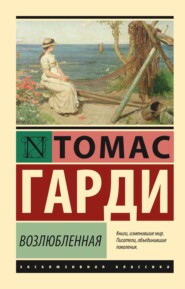По всем вопросам обращайтесь на: info@litportal.ru
(©) 2003-2025.
✖
Wessex Tales
Настройки чтения
Размер шрифта
Высота строк
Поля
Lizzy laughed. ‘Where they mostly are when they’re run so hard as this.’ She cast her eyes to heaven. ‘Up there,’ she said.
Stockdale looked up. ‘What – on the top of the church tower?’ he asked, seeing the direction of her glance.
‘Yes.’
‘Well, I expect they will soon have to come down,’ said he gravely. ‘I have been listening to the officers, and they are going to search the orchard over again, and then every nook in the church.’
Lizzy looked alarmed for the first time. ‘Will you go and tell our folk?’ she said. ‘They ought to be let know.’ Seeing his conscience struggling within him like a boiling pot, she added, ‘No, never mind, I’ll go myself.’
She went out, descended the garden, and climbed over the churchyard wall at the same time that the preventive-men were ascending the road to the orchard. Stockdale could do no less than follow her. By the time that she reached the tower entrance he was at her side, and they entered together.
Nether-Moynton church-tower was, as in many villages, without a turret, and the only way to the top was by going up to the singers’ gallery, and thence ascending by a ladder to a square trap-door in the floor of the bell-loft, above which a permanent ladder was fixed, passing through the bells to a hole in the roof. When Lizzy and Stockdale reached the gallery and looked up, nothing but the trap-door and the five holes for the bell-ropes appeared. The ladder was gone.
‘There’s no getting up,’ said Stockdale.
‘O yes, there is,’ said she. ‘There’s an eye looking at us at this moment through a knot-hole in that trap-door.’
And as she spoke the trap opened, and the dark line of the ladder was seen descending against the white-washed wall. When it touched the bottom Lizzy dragged it to its place, and said, ‘If you’ll go up, I’ll follow.’
The young man ascended, and presently found himself among consecrated bells for the first time in his life, nonconformity having been in the Stockdale blood for some generations. He eyed them uneasily, and looked round for Lizzy. Owlett stood here, holding the top of the ladder.
‘What, be you really one of us?’ said the miller.
‘It seems so,’ said Stockdale sadly.
‘He’s not,’ said Lizzy, who overheard. ‘He’s neither for nor against us. He’ll do us no harm.’
She stepped up beside them, and then they went on to the next stage, which, when they had clambered over the dusty bell-carriages, was of easy ascent, leading towards the hole through which the pale sky appeared, and into the open air. Owlett remained behind for a moment, to pull up the lower ladder.
‘Keep down your heads,’ said a voice, as soon as they set foot on the flat.
Stockdale here beheld all the missing parishioners, lying on their stomachs on the tower roof, except a few who, elevated on their hands and knees, were peeping through the embrasures of the parapet. Stockdale did the same, and saw the village lying like a map below him, over which moved the figures of the excisemen, each foreshortened to a crablike object, the crown of his hat forming a circular disc in the centre of him. Some of the men had turned their heads when the young preacher’s figure arose among them.
‘What, Mr. Stockdale?’ said Matt Grey, in a tone of surprise.
‘I’d as lief that it hadn’t been,’ said Jim Clarke. ‘If the pa’son should see him a trespassing here in his tower, ’twould be none the better for we, seeing how ’a do hate chapel-members. He’d never buy a tub of us again, and he’s as good a customer as we have got this side o’ Warm’ll.’
‘Where is the pa’son?’ said Lizzy.
‘In his house, to be sure, that he mid see nothing of what’s going on – where all good folks ought to be, and this young man likewise.’
‘Well, he has brought some news,’ said Lizzy. ‘They are going to search the orchet and church; can we do anything if they should find?’
‘Yes,’ said her cousin Owlett. ‘That’s what we’ve been talking o’, and we have settled our line. Well, be dazed!’
The exclamation was caused by his perceiving that some of the searchers, having got into the orchard, and begun stooping and creeping hither and thither, were pausing in the middle, where a tree smaller than the rest was growing. They drew closer, and bent lower than ever upon the ground.
‘O, my tubs!’ said Lizzy faintly, as she peered through the parapet at them.
‘They have got ’em, ’a b’lieve,’ said Owlett.
The interest in the movements of the officers was so keen that not a single eye was looking in any other direction; but at that moment a shout from the church beneath them attracted the attention of the smugglers, as it did also of the party in the orchard, who sprang to their feet and went towards the churchyard wall. At the same time those of the Government men who had entered the church unperceived by the smugglers cried aloud, ‘Here be some of ’em at last.’
The smugglers remained in a blank silence, uncertain whether ‘some of ’em’ meant tubs or men; but again peeping cautiously over the edge of the tower they learnt that tubs were the things descried; and soon these fated articles were brought one by one into the middle of the churchyard from their hiding-place under the gallery-stairs.
‘They are going to put ’em on Hinton’s vault till they find the rest!’ said Lizzy hopelessly. The excisemen had, in fact, begun to pile up the tubs on a large stone slab which was fixed there; and when all were brought out from the tower, two or three of the men were left standing by them, the rest of the party again proceeding to the orchard.
The interest of the smugglers in the next manoeuvres of their enemies became painfully intense. Only about thirty tubs had been secreted in the lumber of the tower, but seventy were hidden in the orchard, making up all that they had brought ashore as yet, the remainder of the cargo having been tied to a sinker and dropped overboard for another night’s operations. The excisemen, having re-entered the orchard, acted as if they were positive that here lay hidden the rest of the tubs, which they were determined to find before nightfall. They spread themselves out round the field, and advancing on all fours as before, went anew round every apple-tree in the enclosure. The young tree in the middle again led them to pause, and at length the whole company gathered there in a way which signified that a second chain of reasoning had led to the same results as the first.
When they had examined the sod hereabouts for some minutes, one of the men rose, ran to a disused porch of the church where tools were kept, and returned with the sexton’s pickaxe and shovel, with which they set to work.
‘Are they really buried there?’ said the minister, for the grass was so green and uninjured that it was difficult to believe it had been disturbed. The smugglers were too interested to reply, and presently they saw, to their chagrin, the officers stand several on each side of the tree; and, stooping and applying their hands to the soil, they bodily lifted the tree and the turf around it. The apple-tree now showed itself to be growing in a shallow box, with handles for lifting at each of the four sides. Under the site of the tree a square hole was revealed, and an exciseman went and looked down.
‘It is all up now,’ said Owlett quietly. ‘And now all of ye get down before they notice we are here; and be ready for our next move. I had better bide here till dark, or they may take me on suspicion, as ’tis on my ground. I’ll be with ye as soon as daylight begins to pink in.’
‘And I?’ said Lizzy.
‘You please look to the linch-pins and screws; then go indoors and know nothing at all. The chaps will do the rest.’
The ladder was replaced, and all but Owlett descended, the men passing off one by one at the back of the church, and vanishing on their respective errands.
Lizzy walked boldly along the street, followed closely by the minister.
‘You are going indoors, Mrs. Newberry?’ he said.
She knew from the words ‘Mrs. Newberry’ that the division between them had widened yet another degree.
‘I am not going home,’ she said. ‘I have a little thing to do before I go in. Martha Sarah will get your tea.’
‘O, I don’t mean on that account,’ said Stockdale. ‘What can you have to do further in this unhallowed affair?’
‘Only a little,’ she said.
‘What is that? I’ll go with you.’
‘No, I shall go by myself. Will you please go indoors? I shall be there in less than an hour.’
‘You are not going to run any danger, Lizzy?’ said the young man, his tenderness reasserting itself.
‘None whatever – worth mentioning,’ answered she, and went down towards the Cross.
Stockdale entered the garden gate, and stood behind it looking on. The excisemen were still busy in the orchard, and at last he was tempted to enter, and watch their proceedings. When he came closer he found that the secret cellar, of whose existence he had been totally unaware, was formed by timbers placed across from side to side about a foot under the ground, and grassed over.
The excisemen looked up at Stockdale’s fair and downy countenance, and evidently thinking him above suspicion, went on with their work again. As soon as all the tubs were taken out, they began tearing up the turf; pulling out the timbers, and breaking in the sides, till the cellar was wholly dismantled and shapeless, the apple-tree lying with its roots high to the air. But the hole which had in its time held so much contraband merchandize was never completely filled up, either then or afterwards, a depression in the greensward marking the spot to this day.
CHAPTER VII – THE WALK TO WARM’ELL CROSS AND AFTERWARDS
As the goods had all to be carried to Budmouth that night, the excisemen’s next object was to find horses and carts for the journey, and they went about the village for that purpose. Latimer strode hither and thither with a lump of chalk in his hand, marking broad-arrows so vigorously on every vehicle and set of harness that he came across, that it seemed as if he would chalk broad-arrows on the very hedges and roads. The owner of every conveyance so marked was bound to give it up for Government purposes. Stockdale, who had had enough of the scene, turned indoors thoughtful and depressed. Lizzy was already there, having come in at the back, though she had not yet taken off her bonnet. She looked tired, and her mood was not much brighter than his own. They had but little to say to each other; and the minister went away and attempted to read; but at this he could not succeed, and he shook the little bell for tea.

















